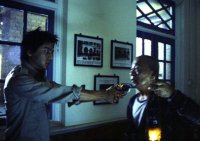

| Ordell Robbie | 1  |
|
| jeffy | 4.5  |
|
| François | 3.75 | Hong-Kong like in a bad dream: bewitching |
| Alain | 4  |
The Nightmare |
With Night Corridor, the name of Julian Lee becomes immediately a name to remember for those who likes strange, stylish movies. After watching his second movie, you end up feeling a bit puzzled, like if you were waking up from a nightmare: you don't understand your dream very well, you have more a feeling than an understanding of it. Night Corridor will of course leave a lot of people disappointed, because it's not answering to all the questions you may have. But it will also captivate a lot of people, those who like special atmosphere and strange stories.
Shot in only 13 days and with a duration of only 70 minutes, Night Corridor is still very dense. It shouldn't be forgotten that this story is adapted from a novel, already written by Julian Lee himself. There is a lot to read in this strange story, strange characters, hidden stories about the past, all mixing together in a special atmosphere, far from the usual view of Hong-Kong. Of course, the desire to create such a special story and atmosphere is a risk, as a lot of people will probably say "there is nothing to understand, it's a mess". But the biggest quality of the movie is probably its ability to recreate the kind of world everybody can have in a dream or a nightmare, where things from the past which were almost forgotten come back to haunt you.
For such a low budget, the cast is extremely solid, from Daniel Wu confirming that he is easily one of the most interesting young actors in Hong-Kong to the veterants Kara Hui, Eddie Ko and Kok Fung all providing good performances. Julian's Lee directing is also very efficient, with a good sountrack and cinematrography, giving a new vision of Hong-Kong. Overall, Night Corridor is a very good example that Hong-Kong cinema is not only about Kung-fu and triad movies. Inspired both by the personnality of Julian Lee and the culture and history of Hong-Kong, that's surely a movie to consider for those who don't like only mainstream commercial cinema.

Plot:After being aware of his brother's death, Sam Yuen (played by Daniel Wu) comes back to Hong-Kong to make some investigations. But quickly, many secrets of his past get revealed.
 After waiting for four years, Julian Lee has finally given a follow-up to his first critically acclaimed movie The Accident. Once again, this is an adaptation of one of his novels and the making of the film is a good example of the difficulty to be an independent HK director when you have some ambitions. Ambitious is a word which suits well Night Corridor because it’s the kind of movies which leads us to wonder about our own conception of what is an Asian film: just as we could point out the American influence on the Korean movie industry (for the best and the worst), this one shows that the globalization of the cinema can goes even further to provide some innovative and hybrid works like Night Corridor. The first thing that catches the viewer’s attention is the way Hong-Kong is being shown because the sets are limited to some particular places which are relics of past, when the West was still a important in the city. Beside the big presence of the catholic religion in the movie (because of the story and also inspired visuals like the flat of Kara Hui which is filled by representations of the Virgin Mary), this influence can also be found in the architecture of the library which is one of the key-place of the movie. But about the visual treatment, it’s interesting to link Julian’s work with the filmography of Dario Argento: on this aspect, fans of giallos won’t be deceived because Julian Lee is as inspired as the Italian master by creating a permanent tension throughout the whole picture: a good example could the shadow of the director (in a cameo) on a wall which visually becomes something surreal and frightening: it just strikes the viewer’s mind by the use of an unconscious violence inherited from the art of painting. Paintings also have an importance in the story and we could make a comparison with The Stendhal’s Syndrome but Julian goes beyond the usual giallo to take tortuous ways…
After waiting for four years, Julian Lee has finally given a follow-up to his first critically acclaimed movie The Accident. Once again, this is an adaptation of one of his novels and the making of the film is a good example of the difficulty to be an independent HK director when you have some ambitions. Ambitious is a word which suits well Night Corridor because it’s the kind of movies which leads us to wonder about our own conception of what is an Asian film: just as we could point out the American influence on the Korean movie industry (for the best and the worst), this one shows that the globalization of the cinema can goes even further to provide some innovative and hybrid works like Night Corridor. The first thing that catches the viewer’s attention is the way Hong-Kong is being shown because the sets are limited to some particular places which are relics of past, when the West was still a important in the city. Beside the big presence of the catholic religion in the movie (because of the story and also inspired visuals like the flat of Kara Hui which is filled by representations of the Virgin Mary), this influence can also be found in the architecture of the library which is one of the key-place of the movie. But about the visual treatment, it’s interesting to link Julian’s work with the filmography of Dario Argento: on this aspect, fans of giallos won’t be deceived because Julian Lee is as inspired as the Italian master by creating a permanent tension throughout the whole picture: a good example could the shadow of the director (in a cameo) on a wall which visually becomes something surreal and frightening: it just strikes the viewer’s mind by the use of an unconscious violence inherited from the art of painting. Paintings also have an importance in the story and we could make a comparison with The Stendhal’s Syndrome but Julian goes beyond the usual giallo to take tortuous ways…
 The beginning credits showing us some Julian’s pictures taken from his exposition Painful Portraits and the fact that the original novel has been inspired by the self-portraits of Leon Spilliaert make of Night Corridor a reflect of these tortured visions and Julian Lee isn’t reluctant to take his story into the darkest areas of the human soul. The movie has been classified as Category 3 and it’s obvious regarding themes like paedophilia and repressed homosexuality mixed in a constant violent mood. The painting used in the movie is called The Nightmare and it suits the mood of the movie because Julian Lee uses a narration typically dreamy, a narration based on the subconscious of his characters and by following this way of storytelling, Night Corridor steps in David Lynch’s cinema by creating his own world away from rationality. Daniel Wu being the only character the viewer can follow, we can just lose control as he does and rely on impulses more than reflection. It’s clear that on this matter the movie will have his bunch of haters like Lynch has already: but who cares as it’s the particularity of directors who make no compromises. But it isn’t perfect and the only flaw is at the end when the movie gives the audience a wink: then all the tension which has been accumulated during the film falls apart but anyway, it doesn’t keep the viewer from having a long-term pleasure after the viewing of the movie.
The beginning credits showing us some Julian’s pictures taken from his exposition Painful Portraits and the fact that the original novel has been inspired by the self-portraits of Leon Spilliaert make of Night Corridor a reflect of these tortured visions and Julian Lee isn’t reluctant to take his story into the darkest areas of the human soul. The movie has been classified as Category 3 and it’s obvious regarding themes like paedophilia and repressed homosexuality mixed in a constant violent mood. The painting used in the movie is called The Nightmare and it suits the mood of the movie because Julian Lee uses a narration typically dreamy, a narration based on the subconscious of his characters and by following this way of storytelling, Night Corridor steps in David Lynch’s cinema by creating his own world away from rationality. Daniel Wu being the only character the viewer can follow, we can just lose control as he does and rely on impulses more than reflection. It’s clear that on this matter the movie will have his bunch of haters like Lynch has already: but who cares as it’s the particularity of directors who make no compromises. But it isn’t perfect and the only flaw is at the end when the movie gives the audience a wink: then all the tension which has been accumulated during the film falls apart but anyway, it doesn’t keep the viewer from having a long-term pleasure after the viewing of the movie.
People who have been waiting for a possible The Accident 2 will be deceived but it’s better to see a director who doesn’t repeat himself and with Night Corridor, Julian Lee really becomes one of the most interesting talents of the current HK cinema and we could start to dream about a third movie which will mix the melancholy of The Accident with the darkness and visual style of Night Corridor but for now, this movie just stands up as being the best example of what the HK independent cinema can offer.